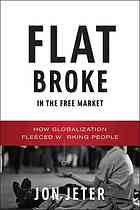
Flat Broke in the Free Market
How Globalization Fleeced Working People
- اطلاعات
- نقد و بررسی
- دیدگاه کاربران
نقد و بررسی

Starred review from February 16, 2009
In an eloquent, no-holds-barred indictment of globalization, Jeter, former Washington Post
bureau chief for southern Africa, weaves the narratives of prostitutes in Buenos Aires and cab drivers in Brazil, tomato sellers in Zambia and an upwardly mobile black woman in Chicago into an analysis of how globalization and free trade have transformed many of the world’s manufacturing hubs into “global flea markets.” There are true moments of heartbreak, particularly when Jeter shows how globalization has slowed progress in postapartheid South Africa and mingles with racism in Brazil, where employers and the state target poor black women for forced sterilization for the putative sake of a larger work force. “The ghetto is in its ascendancy,” he writes, challenging free trade orthodoxy and its ability to reduce poverty with examples of nations like Chile which have rethought their attitudes toward globalization and are moving toward new strength and independence. Jeter’s stinging criticisms are a catalyst for a truthful and painful discussion about who a “global economy” helps and who it destroys.

April 1, 2009
Journalist Jeter indicts globalization.
As the Washington Post's former bureau chief in southern Africa and South America, Jeter covered the regimen of free trade, strong currencies and foreign investment preached by Western agencies to help developing nations break free of poverty. This is globalization, Jeter says, and it's been an unmitigated disaster. He spots compelling human stories in countries where the program hasn't delivered: the Zambian woman who sells tomatoes 12 hours per day, hoping to make enough to feed her family; the Argentine couple who drink tea for dinner so their kids can have the last of the food; the South African children killed in a fire caused by a candle, used by their parents for light because they couldn't afford electricity. But Jeter is uneven in his analysis, blaming this new globalized world for problems that existed before and independently of it. For example, the author devotes an entire chapter to the falling marriage rates of African-Americans, due in part to high unemployment rates among black men, which Jeter blames on free trade. Fair enough, but the Moynihan Report warned the nation of the disintegrating black family more than four decades ago. Fortunately, Jeter's condemnation avoids a misguided call for protectionism. Instead, he proposes that developing nations follow the model of Chile, which has beefed up business regulation and spent public money generously on its social safety net, from health care to education. By investing in its people, he suggests, a country can compete in the new global economy.
Jeter overreaches, but he usefully exposes the underbelly of the free-market system.
(COPYRIGHT (2009) KIRKUS REVIEWS/NIELSEN BUSINESS MEDIA, INC. ALL RIGHTS RESERVED.)

April 15, 2009
This moving account of what poverty looks like in Mexico, Malawi, and Johannesburg (among other sites) by a former Washington Post bureau chief gently sings with the indignity of it all. By personalizing the struggle for survival around the globe (and based on seven years of interviews), whether its an Argentineprostitute or a Zambian tomato seller, Jeter dramatically paints the pictures of the have nots, pointing to political machinations, economic greed, failed governmental policies, and the deconstruction of the family framework as contributing causes to famine, disease, and crime. Readers will recognize many contemporary portraits, including that of Illinois Congressman Bobby Rush, now far from his roots as a Black Panther power to the people, and that of Chicago Afro-American Sonia, who cannot find a comparable mate. Yet he also profiles two countriesChile and Venezuelathat have bucked the system and invested in manufacturing and exports, with no small reduction of the worlds chasm between wealthy and dirt-poor. An impassioned storyteller, Jeter wisely refrains from polemics and preachifying, gaining a powerful voice that, one hopes, will not be ignored.(Reprinted with permission of Booklist, copyright 2009, American Library Association.)




دیدگاه کاربران